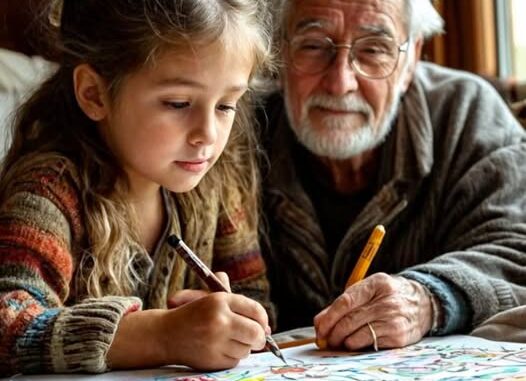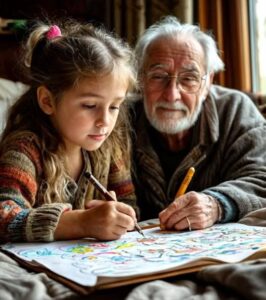
There are stark contrasts in life—between wealth and poverty, kindness and cruelty, knowledge and ignorance. Yet, in the emergency room, all of that fades away. Here, everyone is simply a patient, vulnerable and equal in their suffering.
Still, even in a place where fate levels the playing field, some manage to secure privileges.
Lev Alexandrovich Bessonov was one of them. His private hospital room was a world apart from the crowded wards. It had a personal bathroom, a shower, a refrigerator, an electric kettle, and even a television. The nurses in his wing were attentive, ensuring he lacked nothing.
Yet, despite the comfort, Lev Alexandrovich found no joy. He was a man facing the inevitable—the disease had reached its final stage, and time was slipping away. However, what truly haunted him wasn’t death itself, but the realization that everything he had worked for—his wealth, his achievements—would soon fall into the hands of strangers.
He had already drafted his will. A portion of his estate would go to a local orphanage, another to distant cousins he barely knew. A small sum was set aside for his household staff and driver. He had no direct heirs. His wife, Lena, had passed away three years ago, her heart broken beyond repair after the tragedy that had shattered their lives decades earlier.
Over twenty years ago, Lev, Lena, and their six-year-old daughter, Yulia, had been returning home from their country house. The place had been their sanctuary, with a small garden that provided both sustenance and a modest income. That evening, exhausted from a long day, they dozed off on the train ride home. When they awoke, Yulia was gone.
They searched frantically, alerted the authorities, and clung to hope. But days turned into weeks, then months, then years. Their daughter had vanished without a trace.
Lena never recovered. When Lev suggested having another child, she refused. “I already have a child,” she would say, unable to move forward. She withdrew from the world, leaving household duties to the staff, immersing herself in religion, searching for solace that never came.
Lev, on the other hand, buried himself in work. As a physicist fluent in several languages, he found solace in academia, eventually becoming the head of a department, then the director of a prestigious institute. His career took him around the world, offering distractions from the pain that lingered at home.
Lena’s grief, however, consumed her. The sorrow eventually took its toll, and she passed away, leaving Lev to navigate life alone. He continued his scientific endeavors, living as best he could, until a series of health crises forced him to confront his mortality.
Two heart attacks left him disabled, and the second was especially severe. It was then that he realized just how fleeting life was. The wealth he had accumulated now seemed meaningless.
One morning, as he sat in his hospital bed staring out the window, a nurse named Natasha entered with a warm smile.
“Good morning, how’s our patient today? Ready for breakfast? We have cottage cheese casserole with fruit and some stewed fish with mashed potatoes.”
Lev sighed, barely acknowledging her.
“Breakfast feels pointless,” he thought. But instead of voicing his despair, he simply said, “Just some tea, if that’s alright.”
Natasha frowned, shaking her head. “That’s not enough. You need your strength.”
Feeling embarrassed, Lev relented. “Fine. The casserole, then.”
Pleased with her small victory, the nurse hurried off.
Left alone with his thoughts, Lev couldn’t shake the question that tormented him: *What was the point of it all if I had no one to leave it to?*
That night, he struggled to sleep. His dreams took him to a vast, blooming field where Lena was calling out to him, urging him to follow. He was about to when suddenly, at the edge of the field, he saw his daughter, Yulia, reaching out to him. He bent down, took her small hand, and felt the warmth of her touch.
Startled, he woke up. The room was dimly lit, and to his shock, a little girl was standing beside his bed, holding his hand.
“Yulia?” he whispered, his heart racing.
The child shook her head. “No. My name is Lena. I got lost in the hospital.”
Gathering his strength, Lev sat up. The girl, no older than six, had striking features—ones that reminded him painfully of his long-lost daughter.
“How did you end up here, Lenochka?” he asked.
“I woke up and couldn’t find my mom,” she said, clutching a handful of colorful markers. “I took my markers and went to look for her.”
Lev’s gaze softened. “You like to draw?”
“Yes,” she said proudly. “I’m good at it. Nurse Tanechka gave me these so I wouldn’t be sad.”
“Why were you sad?” he asked gently.
The girl shifted on her feet, revealing a slight limp. “Because… the doctor says my leg will always be like this.”
Lev’s heart clenched.
“Why?” he asked, his voice thick with emotion.
“Mom didn’t let them give me a vaccine,” she explained matter-of-factly.
Silence stretched between them.
Trying to lighten the mood, Lev asked, “Can you draw something for me?”
With excitement, Lena grabbed a sheet of paper and began sketching. As she carefully added details to her drawing, Lev watched with fascination. When she finally turned the paper around, his breath caught.
The woman in the portrait had bright yellow hair, blue eyes, and a distinctive pendant around her neck.
His mind reeled.
“Sister!” he gasped, his pulse racing.
The sudden distress triggered alarms. Nurses rushed in, stabilizing him. In the commotion, Natasha noticed Lena standing there.
“What are you doing here?” she scolded gently. “Come, I’ll take you back to your mother.”
Lena hesitated, her markers slipping from her grasp. Tears welled in her eyes.
“I don’t know where to go,” she whispered.
“Don’t worry,” Natasha soothed, “we’ll find your mom.”
The next morning, Lev was in surprisingly high spirits.
“Good morning, Lev Alexandrovich,” Natasha greeted him. “You look like a new man today.”
“Indeed,” he smiled. “Now, help me find someone.”
He handed her the child’s drawing. “This girl’s mother. She was here last night. It’s important.”
Natasha studied the sketch, nodding before heading off.
An hour later, a woman entered, carrying little Lena in her arms.
She had the same striking features as the child’s drawing, but something else caught Lev’s eye—the pendant. A four-leaf clover, made of onyx set in silver.
His heart pounded.
“It’s the same one,” he murmured. “Yulia?”
The woman hesitated. “My name is Anastasia. But… I was once called Yulia.”
Tears welled in Lev’s eyes.
“My girl… you’ve been found.”
Anastasia gasped. “Are you saying you’re my father?”
“I lost you on a train… you were just six…”
Anastasia’s face paled. “I remember.”
She recounted a harrowing tale of abduction, deception, and survival. She had been taken in by a sect, brainwashed, and denied basic medical care. She had escaped with her daughter only recently.
Lev listened, his heart breaking with every word.
But now, there was hope.
He reached for Lena, pulling her into his arms. “From now on,” he said, voice steady, “you call me Grandpa. And you, Yulia… you call me Dad.”
Tears streamed down Anastasia’s face.
For the first time in decades, Lev Alexandrovich Bessonov truly felt alive.
